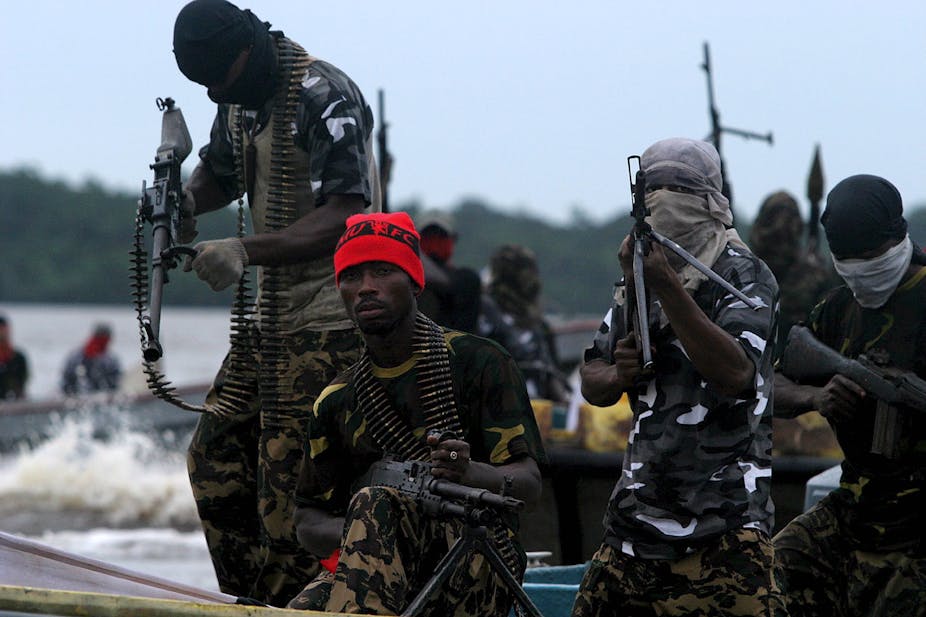The security threat posed by Islamist group Boko Haram in the north-east of Nigeria has attracted international attention – and been cited as the reason for the postponement of the country’s elections until March 28. Less, however, is heard of the Niger Delta militants, who have said they will respond violently should incumbent president Goodluck Jonathan lose his re-election bid.

The militants, who made headlines by blowing up pipelines and kidnapping foreign workers in a bid to control oil revenue, reached a negotiated settlement with the Nigerian state in 2009 – reportedly at a cost of US$500m a year. But some former militants have called for action should Jonathan’s main challenger, Muhammadu Buhari win the election. Other former militants have said they would not react. But drawing on Nigeria’s history of violence around elections, it would be foolish to ignore the warning signs.
Election violence
The main candidates in the election hail from two of Nigeria’s major volatile areas. Buhari is of Fulani origin and is popular in the north, including his home state of Katsina – one of the northern states ravaged by Boko Haram – and around the capital Lagos. Jonathan, however, is an Ijaw from Bayelsa State in the south-east, where he has a stronghold and where the Delta militants are based.
As is characteristic of Nigeria’s elections, Jonathan and Buhari’s political campaigns have been acrimonious and violent. This kind of violence has historically gone hand-in-hand with questions over the quality of freeness and fairness of elections, with frequent accusations of fraudulent activity. The 2003 and 2007 elections were marked by dissatisfaction of election observers, candidates, supporters of candidates and parties, voters, and in some cases the country’s election authority itself, the Independent National Electoral Commission (INEC).

The 2011 elections were generally claimed to be the most credible to be organised since 1999 (they were judged free and fair by observer groups such as Amnesty International, ECOWAS Observation Mission, and the European Union Election Observation Mission to Nigeria), but even then violence was high, claiming around 800 lives in the northern states of Bauchi, Adamawa, Kano and Kaduna (all strongholds of Buhari, who also ran in 2011). It was described in many quarters as the bloodiest election recorded in Nigeria.
If Buhari loses this may happen again. But the potential removal of Jonathan, a key ally in office, will make the Niger Delta unhappy. The rejection of the son of their soil (he is commonly referred to as “The One” in the region) could stir violence – even if Buhari wins the elections in a free, fair and transparent manner.
But it may be more than this. As vice-president, Jonathan was also instrumental in the negotiated settlement of the militants and their whopping US$500m-a-year package. His removal may have dire implications, and one way militants can demonstrate they still have power should Jonathan lose the election is through violence.
In the event of violence

Before the 2011 elections, Buhari reportedly urged supporters to remain in polling stations after casting their votes, and lynch those who attempted any electoral fraud on behalf of opponents. He subsequently lost the election and inevitably claimed it was rigged. Prior to Jonathan leading the PDP in the 2011 elections, a leading member of his own party, Lawal Kaita, said the north was determined to make the country “ungovernable” in the event that Jonathan or any southerner came to power.
Jonathan, of course, did become president and the security situation since then has deteriorated. Any election-security analyses of the 2011 election and beyond must consider a symbiotic relationship between the threats of violence, the subsequent killing of 800 in 2011 and the deterioration of security in Nigeria.
Maturity and leadership: a tough ask
The state has never adequately punished criminality – either the threat of violence and instability before and on polling day or the violence perpetrated afterwards. If Delta violence did break out, would either Jonathan, on his way out, punish wrongdoers, or would Buhari, as a new president, be able to ensure peace? The inability of the state to punish impunity in the past means it is unlikely to lead happen.
What Nigeria needs as a solution in the short term is a show of utmost maturity and leadership by the main contestants and an acceptance of the election verdict. Any complaint must go through official procedures to resolve election disputes rather than inciting supporters to engage in violence. While the Niger Delta militants may not accept a verdict that removes Jonathan from office, the latter could still reach out to his kinsmen to respect the verdict of the people. If Buhari loses, one hopes he would do the same.

But in the long term, the solution that Nigeria needs is national healing through dialogue that addresses ethno-religious differences. The state has yet to take responsibility to heal the great wounds caused by the Biafran War, which ran for over two years from 1967 and claimed thousands of lives, let alone uniting all citizens. It now also has Boko Haram to deal with. We can only hope that the Delta militants who claim they will not react in the event of a Buhari win have the upper hand.

